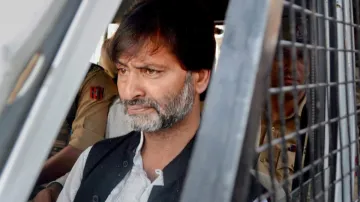In a significant development, the Supreme Court on Monday emphasised the importance of a fair trial system citing the example of of 26/11 terrorist Ajmal Kasab's case. This happened when the court was hearing the Central Bureau of Investigation (CBI) appeal regarding a Jammu court’s direction for local Kashmiri separatist leader Yasin Malik to personally appear to face the trial.
The matter involves two cases: the murder of four Indian Air Force fighters who were gunned down in Srinagar in 1990 and the abduction of Rubaiya Sayeed, daughter of Minister Mufti Mohammed Sayeed in 1989. Yasin Malik is the main accused in both cases.
Malik, who is currently serving a life term in Tihar Jail in a case related to terror financing activities, has been issued warrants in a suit against him under the Terrorist and Disruptive Activities (Prevention) Act (TADA) and was asked to attend the court physically in 2022. While the proceedings have been set for a certain date, Malik has expressed his wish to be present for those, while the CBI has opposed the order due to fears that witnesses may be compromised and that the situation in Jammu and Kashmir would be disturbed. The agency submitted that the risk of Malik being present posed by his presence threatened public peace and the protection of witnesses.
In the case represented by CBI, Solicitor General Tushar Mehta addressed the Supreme Court Bench consisting of AS Oka and AG Masih saying that they were against taking Malik to Jammu for trial due to the security issues. The Solicitor General emphasized that Malik was not "just another terrorist," pointing out his past associations, including his public appearances with Hafiz Saeed, the founder of the Lashkar-e-Taiba terror group. Mehta further claimed that Malik's insistence on appearing in person was a "trick" designed to delay the proceedings.
The bench, however, commenced inquiry on how the trial would be conducted in an online platform; in light of the poor internet connectivity in Jammu. Justice Oka remarked, “With such connection, how do you expect to conduct cross-examination on video?” He further stated in the courtroom, “In this country, even Ajmal Kasab was entitled to a trial until the very end,” reminding everybody in the courtroom that justice is given regardless of the conditions.
The court advised another way of finding the way out, testing whether it would be possible to conduct the trial within the Tihar Jail where Malik is held at the moment. The bench ordered the CBI to assess how many witnesses would be called in view of the sensitivity of the case and to provide for their protection. The court further explored ways of conducting the trial inside the prison and sought details on the possibility of designating a judge for that purpose.
The next hearing is scheduled for November 28, and the court has permitted the CBI to modify its plea by making all accused as respondents in the case. The crux of the CBI’s plea lies in the Criminal Procedure Code, Section 268 under which it is provided that the States may not allow the physical production of a prisoner in any court, for a valid cause.
For all that, concern will turn to the apex court on the issues related to the trial of Yasin Malik which has wider ramifications not only for the case in question but also for national security and justice in general.
